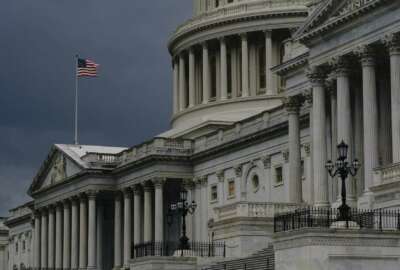
White House pitches billions in supplemental funding for upcoming continuing resolution
With a short-term continuing resolution nearly inevitable to start the upcoming fiscal year, the White House submitted a lengthy list of budget anomalies it...
The White House is proposing billions of dollars in supplemental funding for disaster relief and other programs, which it’s asking Congress to attach to a short-term continuing resolution that will be critical toward avoiding a government shutdown at the end of the month.
“With the end of the fiscal year rapidly approaching, it’s clear that Congress will need to pass a short term continuing resolution to provide more time for the fiscal 2022 process to unfold,” Shalanda Young, the Office of Management and Budget’s acting director, said Tuesday in a blog post. “The window provided by a short-term CR will allow movement toward bipartisan agreement on smart, full-year appropriations bills that reinvest in core priorities, meet the needs of American families, businesses and communities and lay a strong foundation for the future.”
The current fiscal year ends Sept. 30, and Congress must pass a temporary short-term continuing resolution to keep federal agencies operating with current funding levels beyond that date.
But a CR won’t cover a growing list of needs the White House believes are immediate, and it submitted a lengthy list of changes, known as budget “anomalies,” to include in an upcoming stop-gap funding measure.
“The purpose is to help avoid severe disruptions to certain public services that could happen under a CR if it’s just extended last year’s appropriations bills without modification,” an administration official told reporters Tuesday.
The majority of the supplemental request includes funding for both disaster relief and the administration’s ongoing Afghanistan resettlement efforts.
The White House is looking for an additional $14 billion in disaster relief funding, which administration officials said would cover “remaining unmet needs” from hurricanes, ongoing wildfires and other natural disasters that occurred before Hurricane Ida devastated parts of the Gulf Coast and Northeast last week.
Agencies will need even more funding — at least $10 billion according to initial White House estimates — for Ida response efforts.
“We don’t yet have precise estimates of the damages and needs, but what we’re saying is that those needs will amount to at least $10 billion,” the administration official said. “We’re committed to working closely with Congress to refine those numbers, understand the needs and include the requisite funding in the legislative vehicle, so it can be provided to states and communities in a timely fashion.”
The Biden administration is also seeking an additional $6.4 billion for the Departments of Health and Human Services, Defense and State to continue resettlement efforts for evacuees from Afghanistan.
Those agencies need funding to house and screen Afghan evacuees and then process and resettle eligible refugees to live in the United States, the administration said.
According to the White House request, military services need an extra $2.4 billion to pay their personnel providing transportation services for Afghan evacuees.
U.S. Citizenship and Immigration Services also needs $342 million to ramp up staffing and resources to process additional refugee applications and address an existing backlog of at least 4 million pending cases, according to the White House’s request.
Administration officials declined to say how long they thought a prospective continuing resolution should last — or whether Congress should tie a CR to potential legislation raising the debt ceiling.
“We fully expect Congress to act promptly to suspend the debt limit and to protect the full faith and credit of the United States, and we expect them to do that in a bipartisan way, just as they did three times during the prior administration,” an official said.
Beyond the supplemental requests for more disaster relief and Afghanistan resettlement support, the White House detailed several other programs that need additional funding or reauthorization.
The Census Bureau, for example, needs $1.1 billion to cover operational activities associated with the 2020 and 2030 decennial counts, as well as the economic census and other projects.
“Funding enacted for this account in fiscal 2021 relied on significant unobligated balances, which are now depleted. Without the anomaly, decennial census operations, preparations for the 2022 economic census, and development of the data ingest and collection for the enterprise program will be negatively impacted,” the supplemental request reads.
Customs and Border Protection, Immigration and Customs Enforcement and the Transportation Security Agency need additional funding to maintain their presence at the southern border, facilitate the entry of evacuees from Afghanistan and maintain staffing levels, the White House said.
The supplemental request would also reauthorize the National Flood Insurance Program, allow DoD to continue certain military construction projects and extend the authority for members of the Public Health Service Commissioned Corps to carry over unused annual leave for another year.
In addition, the Department of Veterans Affairs needs the authority to transfer existing funds to the Board of Veterans Appeals to handle an anticipated increase in disability claims, the administration said.
VA established three new presumptive conditions associated with Agent Orange for veterans who served in southwest Asia and other areas. Without the anomaly, the White House said VA will face processing and appeals delays with these new claims.
The administration is also seeking an additional $5 million to stand up the Asset and Infrastructure Review Commission, which, under the 2018 MISSION Act, is supposed to begin its work next January. The AIR Commission will eventually review and recommend VA health care facilities to close or consolidate, similar to the base realignment and closure process the Pentagon last undertook in the mid-2000s.
Copyright © 2024 Federal News Network. All rights reserved. This website is not intended for users located within the European Economic Area.
Nicole Ogrysko is a reporter for Federal News Network focusing on the federal workforce and federal pay and benefits.
Follow @nogryskoWFED





